- EasyCard
- Trade
- Help
- Announcement
- Academy
- SWIFT Code
- Iban Number
- Referral
- Customer Service
- Blog
- Creator
UK work permit: requirements, how to apply and cost
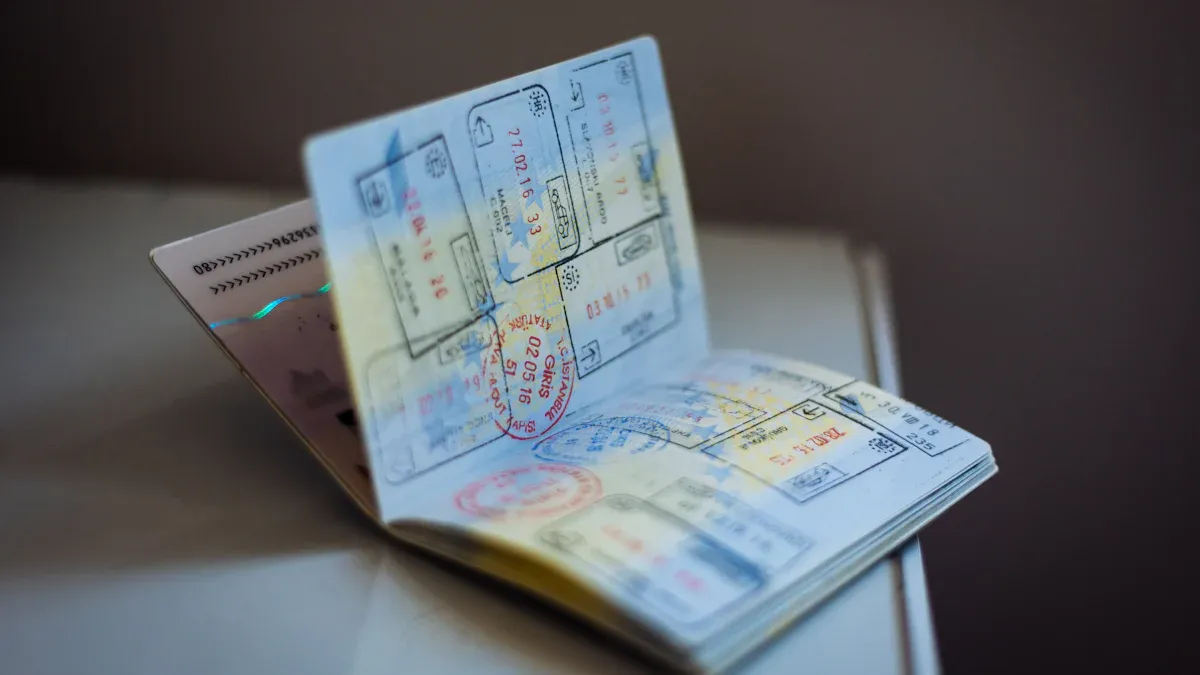
Image Source: unsplash
If you want to work in the UK, you usually need a work permit. Most non-UK nationals must get a uk work permit before starting a job. A work permit gives you legal permission to work, helps you find roles that match your skills, and may lead to long-term residency in the UK. Many people apply each year. In the year ending June 2024, the UK granted over 286,000 work visas to main applicants. Before you start your application, check if you meet the requirements.
Common reasons for needing a work permit in the UK:
- Legal right to work in the UK
- Access to more job opportunities
- Career growth and skill matching
- Need for employer sponsorship
- Pathways to residency
Key Takeaways
- Most non-UK nationals need a work permit to work legally in the UK and access job opportunities.
- You must have a valid job offer from a licensed UK employer and meet salary, skills, and English language requirements.
- Several visa types exist, including Skilled Worker, Temporary Work, and High Potential Individual visas, each with different rules.
- The application process involves getting a Certificate of Sponsorship, submitting documents online, attending a biometric appointment, and paying fees.
- Costs include visa fees and a health surcharge, with options for faster processing at extra cost; family members can join if you meet support and relationship rules.
Who Needs a Work Permit for the UK
If you want to work in the UK, you usually need a work permit. The rules depend on your nationality, job type, and how long you plan to stay. Understanding who needs a work permit for the UK helps you avoid mistakes and delays in your application.
Eligibility Criteria
You must meet several eligibility criteria before you can apply for a UK work visa. These requirements help the UK government make sure you are ready to work and live in the country. Here are the main eligibility criteria for a work permit:
| Eligibility Criteria | Description |
|---|---|
| Valid Job Offer | You need a confirmed job offer from a UK employer licensed as a sponsor. |
| Salary Requirements | Your job must meet the minimum salary set for your visa type. |
| English Proficiency | You must show you can speak, read, write, and understand English at the required level. |
| Skills and Qualifications | You need the right skills, experience, and qualifications for the job. |
| Immigration Health Surcharge (IHS) | You may need to pay the IHS as part of your visa application. |
You also need to show you have enough money to support yourself. Most applicants must have at least $1,600 USD (based on current exchange rates) in savings for one month. You prove this with bank statements from the last 28 days. Some people do not need to show this if they have lived in the UK for 12 months on another visa.
English language skills are important for most UK work visa types. You can meet this requirement by:
- Passing an approved Secure English Language Test (SELT) like IELTS, LanguageCert, Pearson, or Trinity College London.
- Having a degree taught in English from a recognized school.
- Being a citizen of a majority English-speaking country, such as the USA, Canada, or Australia.
The level of English you need depends on your visa. For example, the Skilled Worker visa and Health and Care Worker visa require a B1 level (IELTS score of 4.0 in each part).
When a Work Permit Is Not Required
You do not always need a work permit for the UK. Some people can work without a visa or with a different type of permission. You may not need a work permit if you:
- Are a British or Irish citizen.
- Have settled or pre-settled status under the EU Settlement Scheme.
- Hold indefinite leave to remain in the UK.
- Visit the UK for certain business activities that do not count as employment.
Most other people need a UK work permit. The main groups who need a work permit include:
- Skilled Workers
- Health and Care Workers
- Intra-company Transfers
- Religious Workers
- Elite Sportspersons or Coaches
- Youth Mobility Scheme participants
- Temporary Workers (such as Creative and Sporting, Charity Workers, and Government Authorized Exchange)
Always check the latest UK work visa requirements before you apply. This helps you avoid problems and makes your application smoother.
Types of UK Work Visas
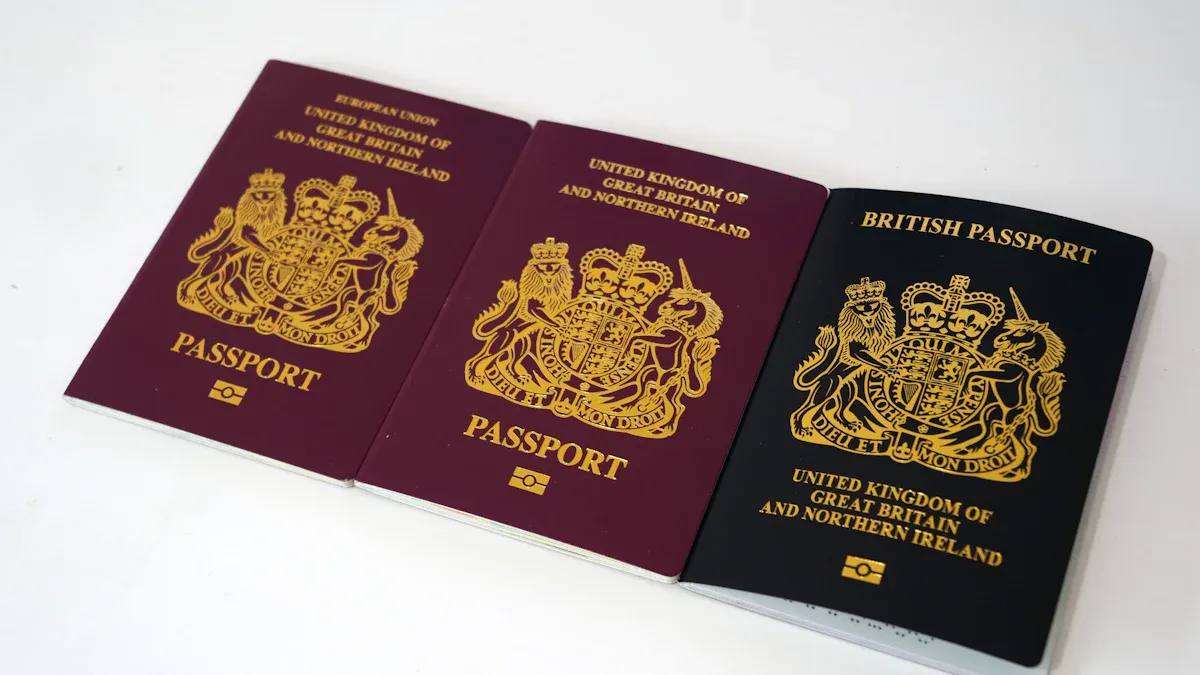
Image Source: unsplash
The UK offers several uk work visa options for people who want to work in the country. Each visa type has different requirements and suits different needs. You should review the uk work visa requirements before you apply. The table below shows the main categories and examples of uk work visa types:
| Visa Category | Visa Types Included |
|---|---|
| Popular Work Visas | Skilled Worker visa, Skilled Worker visa extension, Health and Care Worker visa, Graduate to Skilled Worker visa |
| Start a Business | Innovator Founder visa |
| Work Visas Without Job Offer | Graduate visa, Global Talent visa, UK Ancestry visa |
| Temporary Work Visas | Seasonal Worker visa, Creative Worker visa, Religious Worker visa, Charity Worker visa, International Agreement visa, Government Authorised Exchange visa |
| Other Work Visas | International Sportsperson visa, Minister of Religion visa, Scale-up Worker visa, Frontier Worker Permit, Representative of an Overseas Business visa |
Skilled Worker Visa
You can apply for the skilled worker visa if you have a job offer from a licensed UK employer. This uk work visa is popular for people who want to work in healthcare, IT, engineering, finance, or education. You must meet several requirements:
- You need a job offer from a UK employer with a valid sponsor license.
- You must be at least 18 years old.
- You need a Certificate of Sponsorship for your job.
- Your job must meet the skill level (at least RQF Level 3).
- You must meet the minimum salary threshold.
From 2025, the standard minimum salary for this visa is $49,000 USD (based on current exchange rates). If you have a relevant PhD, the minimum is lower. The chart below shows the salary requirements for different categories:
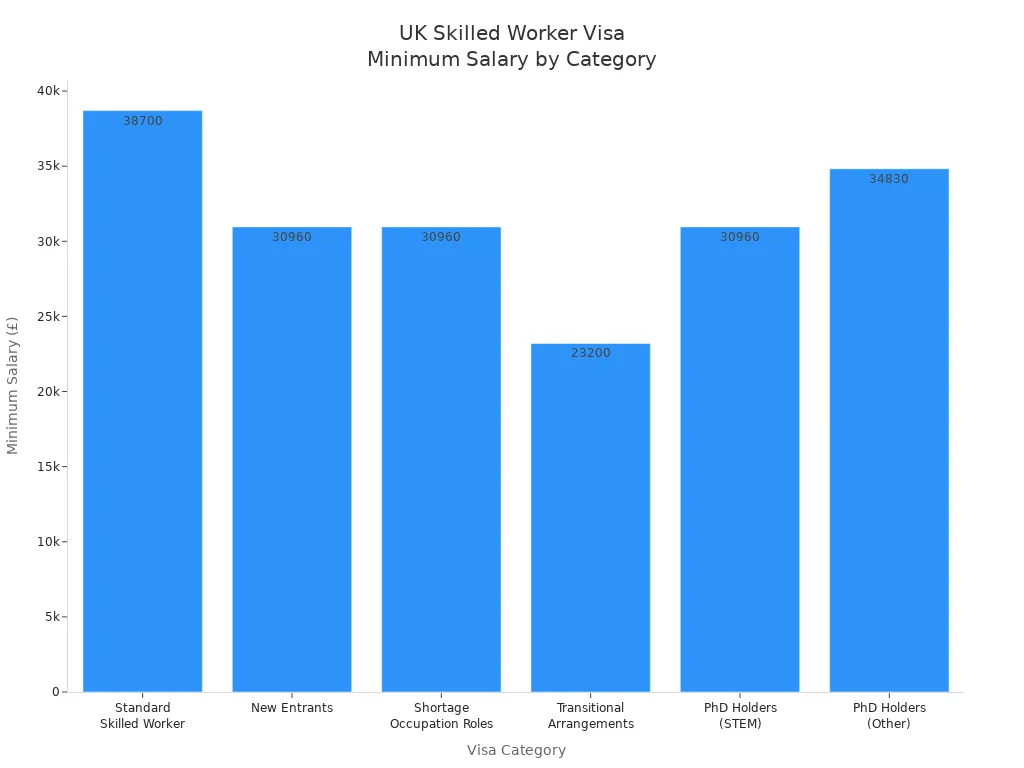
Many jobs in healthcare, IT, engineering, and education qualify for this visa. If your job is on the Immigration Salary List, you may have a lower salary requirement.
Temporary Work Visas
Temporary work visas let you work in the UK for a short time. These visas include the Charity Worker visa, Creative Worker visa, Government Authorised Exchange visa, International Agreement Worker visa, Religious Worker visa, Seasonal Worker visa, and Youth Mobility Scheme visa. Most require a job offer and sponsorship from a UK employer. The table below explains the main features:
| Feature/Restriction | Details |
|---|---|
| Visa Categories | Creative and Sporting, Charity Worker, Religious Worker, Government Authorised Exchange, International Agreement, Seasonal Worker, Youth Mobility |
| Sponsorship Requirement | Most categories require a job offer and sponsorship from a UK employer registered with the Home Office |
| Duration | Typically 12 to 24 months, with some extension options |
| Family Members | Some categories allow dependents to accompany the visa holder |
| Employment Scope | Employment must align with the specific visa category |
| Access to Public Funds | Not allowed |
| Pathway to Settlement | No direct route to permanent residency or settlement; other visa categories needed for ILR |
| Financial Requirements | Applicants must prove financial maintenance or have employer certify maintenance |
| Application Process | Online application, biometric appointment, and supporting documents required |
You cannot use these visas for permanent residency. You must follow the rules for your visa category.
Other UK Work Permit Options
The UK also offers other uk work visa options. Some do not need a job offer or sponsorship. For example, the high potential individual visa lets you work in the UK if you graduated from a top university in the last five years. You must meet the eligibility requirements for the uk high potential individual visa before you apply for the hpi visa. The table below lists more options:
| Visa Type | Purpose/Eligibility | Sponsorship Required? |
|---|---|---|
| Government Authorised Exchange | Short-term knowledge exchange, training, research, fellowships. | Yes |
| International Agreement | Work under international law/treaty, diplomatic or international organisation roles. | Yes |
| Religious Worker | Religious work in non-pastoral roles or religious orders. | Yes |
| Seasonal Worker | Work in edible horticulture for up to 6 months. | Yes |
| Youth Mobility Scheme | Ages 18-30, work and live for up to 2 years, self-employment allowed, no sponsorship needed. | No |
| Graduate Visa | Stay for at least 2 years after graduation from eligible courses. | No |
| High-Potential Individual (HPI) | Stay for at least 2 years after graduating from an eligible university within last 5 years. | No |
If you want to apply for the hpi visa, you do not need a job offer. This makes it easier for recent graduates to start their careers in the UK. Always check the latest uk work visa requirements before you apply.
How to Apply for a UK Work Visa
Step-by-Step Process
You can start your uk work visa application once you know you meet the requirements. The process for how to apply for a uk work visa is clear and follows a set order. Here is a step-by-step guide to help you:
- Check your eligibility. Make sure you have a valid job offer from a UK employer with a sponsorship license. Confirm you meet the points-based system, have proof of english proficiency, and enough funds.
- Get your Certificate of Sponsorship. Your employer will give you this through the UKVI Sponsor Management System. This is a key part of sponsorship for uk work visas.
- Complete the online application form for your chosen uk work visa. Fill in your personal and job details carefully.
- Pay the application fees. You must pay both the visa fee and the Immigration Health Surcharge.
- Gather and submit your supporting documents. These include your passport, proof of english, financial evidence, and your Certificate of Sponsorship reference number.
- Book and attend a biometric appointment. You will give your fingerprints and have your photo taken at a visa application center.
- Wait for a decision. The UKVI may ask for more information. Most decisions take 3 to 8 weeks.
- Receive your visa decision. If approved, you get a 30-day vignette in your passport or a Biometric Residence Permit if you applied inside the UK.
- Travel to the UK within the vignette period. Collect your Biometric Residence Permit from a Post Office.
- Start your job in the UK. Make sure you follow all visa conditions.
Tip: Always double-check your application details and documents before you submit. Mistakes can delay your work visa application.
Required Documents
You need to prepare a full set of documents for your uk work visa application. The document checklist for uk work visas helps you stay organized. Here are the main documents you must provide:
- Certificate of sponsorship reference number from your UK employer (sponsorship for uk work visas)
- Valid passport with at least one blank page
- Proof of english proficiency, such as an approved test result or a degree taught in english
- Tuberculosis test results, if you come from certain countries
- Criminal record certificate, if your job is in education, health, or social care
- Academic Technology Approval Scheme (ATAS) certificate, if your job needs it
- UK PhD certificate or Ecctis reference number, if you claim points for qualifications
- Employment contract with job title, salary, and terms
- Proof of relationship documents for dependents, like marriage or birth certificates
- Accommodation details, such as a rental agreement or sponsor letter
You may need extra documents based on your situation. If your documents are not in english or Welsh, you must provide certified translations. The document checklist for uk work visas can change, so always check the latest list before you apply.
Applying from Inside or Outside the UK
You can submit your uk work visa application from inside or outside the UK. The process is similar, but there are some differences you should know.
If you apply from outside the UK:
- You complete your application online from your home country.
- You attend a biometric appointment at a visa application center in your country.
- You receive a 30-day vignette in your passport if your visa is approved.
- You travel to the UK and collect your Biometric Residence Permit at a Post Office.
If you apply from inside the UK:
- You can switch to a uk work visa from another eligible visa or extend your current work visa.
- You fill out the online application and upload your documents.
- You attend a biometric appointment at a UK Visa and Citizenship Application Services (UKVCAS) center.
- You receive a Biometric Residence Permit if your application is successful.
Note: You cannot apply from inside the UK if you hold a short-term visa, such as a visitor visa. Always check if your current visa allows you to switch to a uk work visa.
The steps for how to apply for a uk work visa stay mostly the same, but the location and some details may change. Make sure you follow the correct process for your situation. This helps you avoid delays and problems with your work visa application.
UK Work Permit Costs and Processing

Image Source: pexels
Application Fees
When you apply for a uk work visa, you need to pay an application fee. The fee depends on the type of visa and how long you plan to stay in the uk. You can see the main fees in the table below. All amounts are shown in USD, based on current exchange rates.
| Work Visa Category | Duration | Application Fee (USD) | Total with Healthcare Surcharge (USD) |
|---|---|---|---|
| Skilled Worker (up to 3 years) | Up to 3 years | $980 | $4,940 |
| Skilled Worker (over 3 years) | Over 3 years | $1,940 | $8,550 |
| Health & Care Worker (up to 3 yrs) | Up to 3 years | $360 | $360 (surcharge exempt) |
| Health & Care Worker (over 3 yrs) | Over 3 years | $700 | $700 (surcharge exempt) |
| Youth Mobility Scheme | Up to 2 years | $380 | $1,980 |
| Innovator Founder | Up to 3 years | $1,620 | $4,725 |
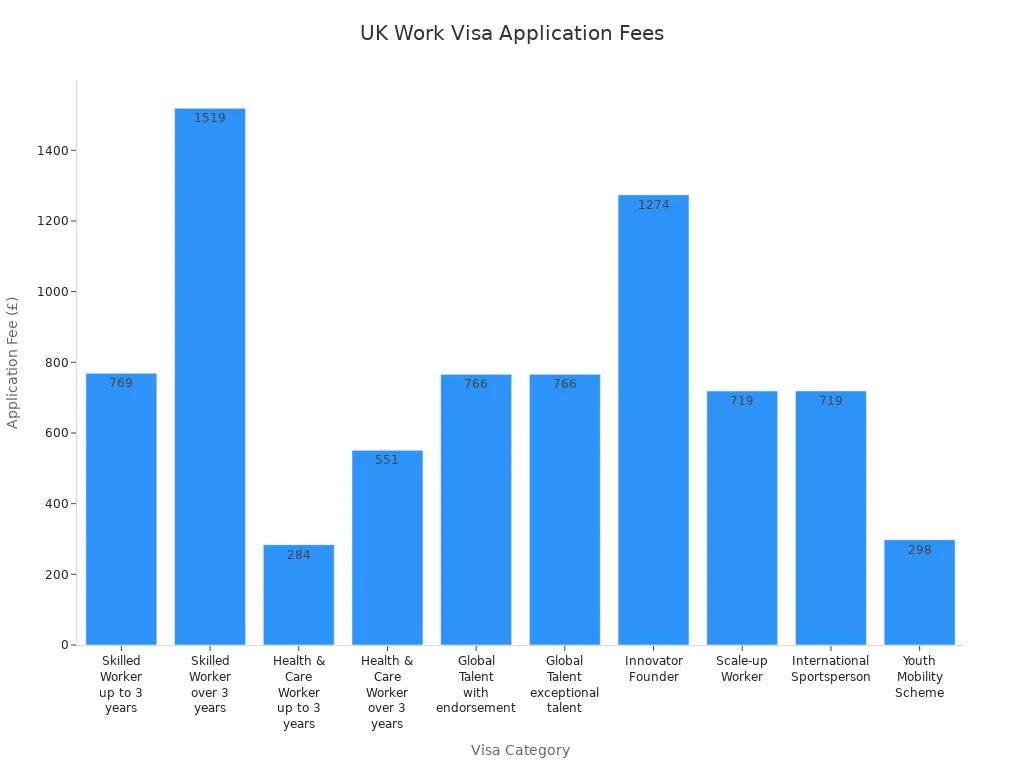
You must pay the application fee when you submit your uk work visa application. Some specialist visas, like the Innovator Founder or Global Talent, have extra endorsement fees.
Healthcare Surcharge
Most uk work visa applicants must pay the Immigration Health Surcharge (IHS). This fee is $1,320 per year for most adults. The IHS lets you use the UK’s National Health Service (NHS) for free, including doctor visits, hospital care, and mental health support. Some services, like prescriptions or dental care, may still have a small cost. Health and Care Worker visa holders do not pay the surcharge. You must pay the full IHS amount for your entire visa duration when you submit your application.
Priority Processing and Timelines
The standard uk work visa processing time is about three weeks if you apply from outside the uk. If you apply inside the uk, it may take up to nine weeks. You can pay extra for faster service. Priority processing costs $650 and gives you a decision in five working days. Super-priority processing costs $1,300 and gives you a decision by the next working day. These options help if you need your visa quickly. Not all visa types offer priority services, and availability can change.
Note: Always check the latest uk work visa processing time before you apply. Complex applications may take longer.
Special Cases and Family Members
Self-Employment Options
If you want to be self-employed in the UK, you need to know the rules for your visa. The uk work visa system links most work permits to a job with a licensed sponsor. If you hold a Skilled Worker or Tier 2 visa, you cannot start your own business or become self-employed. You also cannot be a director, partner, or own more than 10% of your sponsor company. The rules are strict because the visa connects to your employer.
You may do some freelance work, but only if:
- The freelance job is on the Shortage Occupation List.
- The work matches the code of your sponsored job.
- You do not work more than 20 hours per week in this role.
- The freelance work is only a supplement to your main job.
If you lose your sponsored job, you cannot continue living and working in the uk as self-employed. You must find a new sponsor or apply for a different visa. If you want to start your own business, you should look at other options like the Innovator Founder Visa. This visa is for people with new and creative business ideas. Self-employment in the UK means you run your own business, pay taxes, and do not get employee benefits.
Bringing Family to the UK
You can bring your family to the UK if you hold a valid uk work visa. Your family members must meet certain requirements to join you. Here is what you need to show:
- Proof of relationship, such as a marriage certificate or proof you have lived together for two years.
- Enough money to support your family. You must earn at least $36,800 USD per year or have savings over $20,300 USD.
- Proof of a place to live in the UK, like a rental agreement.
- English language skills for adult family members.
- Both you and your partner must be over 18 years old.
You must also show you have enough funds for each dependent. The table below shows the required amounts:
| Dependent Type | Required Funds Amount (USD) | Additional Conditions |
|---|---|---|
| Spouse/Partner | $370 | Funds held for 28 consecutive days |
| One Child | $410 | Funds held for 28 consecutive days |
| Each Additional Child | $260 | Funds held for 28 consecutive days |
| Main Skilled Worker | $1,650 | For your own visa application |
Note: If you have lived in the UK for over a year or your employer covers costs, you may not need to show these funds.
You must provide bank statements and proof of income. This helps show you can support your family without public funds. Meeting these rules lets your family continue living and working in the uk with you.
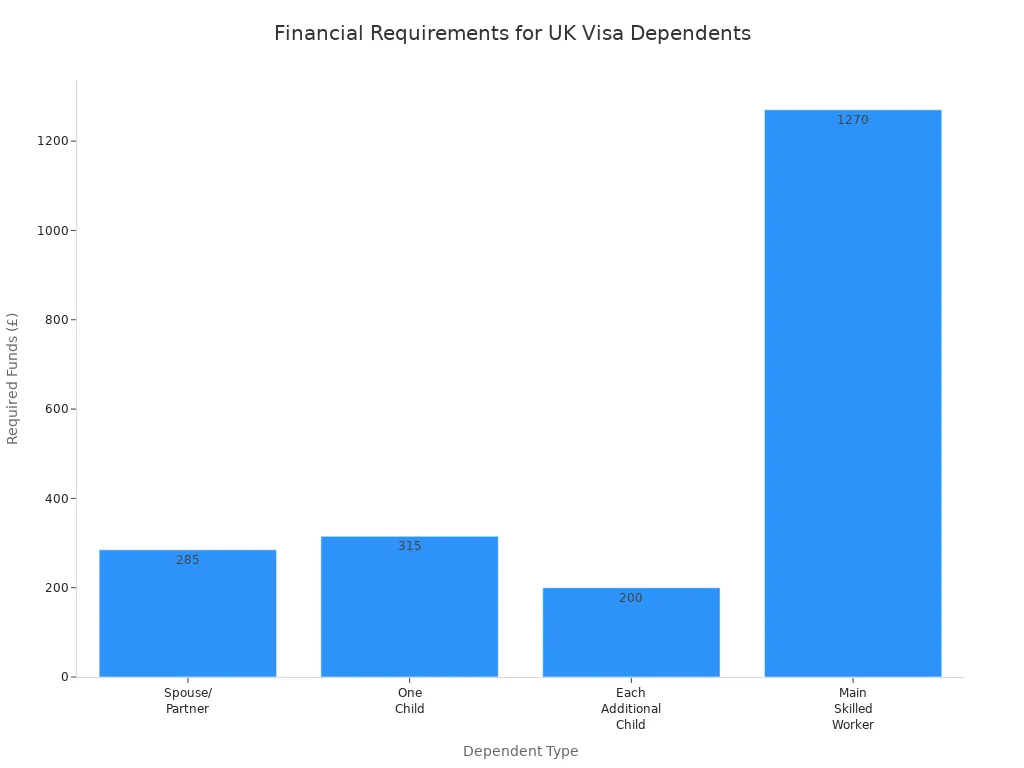
To succeed with your UK work permit, follow these steps:
- Check your eligibility and choose the right visa using the UK government’s visa finder.
- Secure a sponsored job offer and get your Certificate of Sponsorship.
- Gather all required documents and complete your application online.
- Attend your biometric appointment and wait for your decision.
Always double-check your requirements and documents. Visit gov.uk for the latest updates. If you need help, speak with an immigration advisor. You can achieve your goal with careful planning and attention to detail.
FAQ
What happens if you lose your job while on a UK work visa?
If you lose your job, your visa may become invalid. You must find a new sponsor and apply for a new visa. If you cannot, you may need to leave the UK.
Can you switch from a student visa to a work visa in the UK?
Yes, you can switch from a student visa to a work visa if you meet all requirements. You need a job offer from a licensed sponsor and must apply before your student visa expires.
Do you need to show proof of funds for every UK work visa?
Most work visas require proof of funds. You must show you have enough money to support yourself. Some exceptions exist if you have lived in the UK for over a year or your employer covers your costs.
Can your family members work in the UK as dependents?
Your spouse or partner and children can work or study in the UK if they come as your dependents. They must follow the rules for dependents and have valid visas.
How long does it take to get a decision on your UK work visa application?
Standard processing takes about three weeks if you apply from outside the UK. Priority services can give you a decision in five days or even one day for an extra fee.
Applying for a UK work permit often means transferring large amounts of money for visa fees, proof of funds, or family support. Traditional banks can charge high fees, take days to process, and offer poor exchange rates. With BiyaPay, you get a faster, cheaper, and more transparent solution. Our remittance fees start at just 0.5%, with real-time FX rates and same-day delivery. Whether you need to show bank statements for your application or support dependents in the UK, BiyaPay helps you keep more of your money while moving it securely.
Take control of your international transfers today — sign up with BiyaPay and make your UK work journey more affordable.
*This article is provided for general information purposes and does not constitute legal, tax or other professional advice from BiyaPay or its subsidiaries and its affiliates, and it is not intended as a substitute for obtaining advice from a financial advisor or any other professional.
We make no representations, warranties or warranties, express or implied, as to the accuracy, completeness or timeliness of the contents of this publication.




Contact Us
Company and Team
BiyaPay Products
Customer Services
is a broker-dealer registered with the U.S. Securities and Exchange Commission (SEC) (No.: 802-127417), member of the Financial Industry Regulatory Authority (FINRA) (CRD: 325027), member of the Securities Investor Protection Corporation (SIPC), and regulated by FINRA and SEC.
registered with the US Financial Crimes Enforcement Network (FinCEN), as a Money Services Business (MSB), registration number: 31000218637349, and regulated by FinCEN.
registered as Financial Service Provider (FSP number: FSP1007221) in New Zealand, and is a member of the Financial Dispute Resolution Scheme, a New Zealand independent dispute resolution service provider.



















